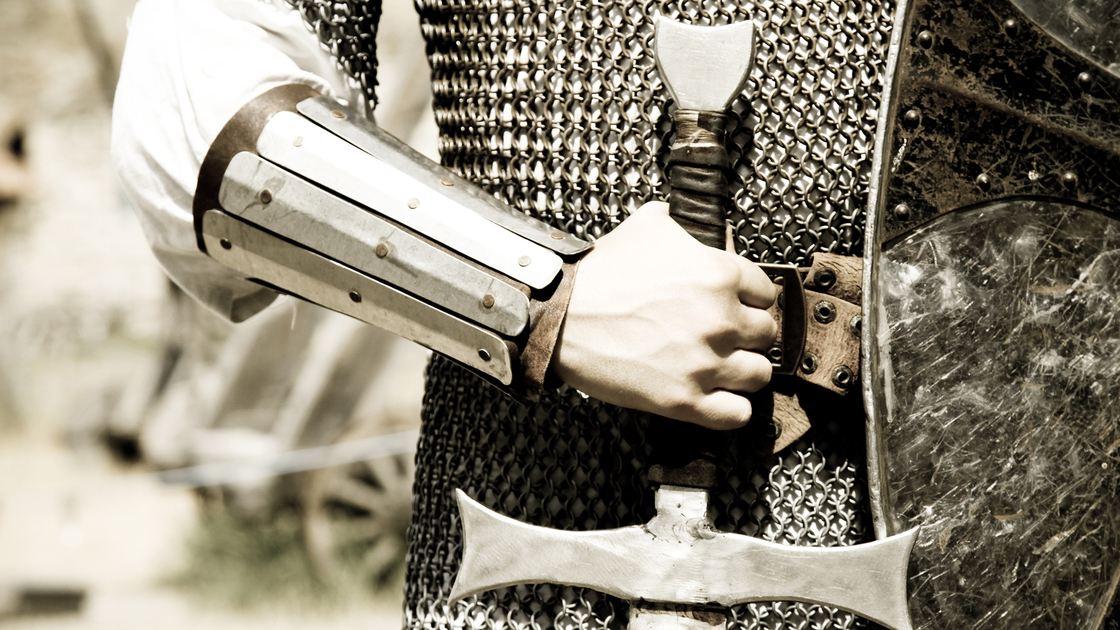
Mighty spiritual soldiers like Paul and Christ knew how to endure hardness—and even to embrace it (e.g. 2 Timothy 2:3; 2 Corinthians 11:24-28; Hebrews 12:2; 5:7-9; John 16:33). Warriors maintain emotional composure and mental balance, even when being attacked. The spiritual fighters who have gone before us have endured and embraced beatings, stoning and crucifixion.
Great physical warriors achieve this self-mastery to an impressive degree. How? Through a lot of diligent practice and extremely difficult training.
Our natural impulse is to run from hardness. Soldiers master this impulse by going on the offensive. They do hard things over and over and over. They force themselves into the habit of living outside their comfort zones—in order to continually expand what they can handle. Rather than waiting for challenges to besiege them, they run to the challenge.
“A unique, if unfair, aspect of our beautiful human condition is that if you avoid challenge, it will come anyhow, bringing with it severe and painful lessons,” one longtime Navy seal commander writes. “The more you try to dodge them or insulate yourself through the trappings of wealth, emotional armor, or numbing agents like alcohol, the harder the challenges become. I recommend that you take yourself to the challenge instead of waiting for it to come to you as a way to burn off your lethargy in a controlled environment.”
Such challenges may take many forms. One that physical soldiers use to extremely good effect is through vigorous physical training.
Embrace the Pain to Get the Gain
At headquarters, we definitely use this principle in our physical education program, which starts in elementary school and carries through the sophomore year of college. It is strenuous; it pushes students to the edges of their comfort zone.
Our biggest obstacle is not poor core strength or muscle atrophy or nutrition. It’s motivation—keeping people engaged and determined. But that is really the problem with everything truly good in life. You have to get over the hump of doing that hard thing to the point where you start to realize, It’s hard, but I love it. I feel so much better when I do that hard thing!
We tend to focus on the physical benefits of exercise, and there are certainly plenty of those. However, the mental, emotional and even spiritual benefits can be just as great. In a controlled environment, you can push the margins of your comfort zone, face down fear and doubt, combat lethargy, build discipline and self-mastery, grow in mental toughness, and break open hidden wellsprings of capacity and power. Exercise can help you learn to endure hardness. The harder you work, the more of these benefits you gain, and the faster you grow.
“[W]hen you consistently experience the personal growth that accrues from deliberately putting yourself out of balance, such as with hard workouts, you begin to embrace that temporary pain for the rewards it brings. The fear recedes into oblivion as you embrace the [challenge],” that Navy seal said.
Yes, exercise is uncomfortable. It involves sweat and sore muscles. But every time you do it—every time you embrace living a bit beyond the edge of your comfort zone—you’re expanding that zone and growing as a person.
Even the soreness you feel after exercise—which is caused by microtears in the muscle tissue—is a sign that your muscles are rebuilding. When muscles rebuild, they become stronger and more pliable—making you stronger and more pliable. That’s the way the Creator designed our bodies to work. Your muscle rapidly adapts to reduce further damage from the same exercise. That means, not only will you be less sore next time, but also you’ll recover more quickly. On top of all that, exercise increases pain thresholds and pain tolerance. So embrace that soreness.
God made our bodies to work! He made them to be able to endure hardness. In fact, He made them to need hardness in order to flourish! If you don’t use it, you will lose it. You will get soft and weak and break down. Muscles love heavy use: The more you use them, the healthier they become.
The same is true spiritually in many ways. “My brethren, count it all joy when ye fall into divers temptations” (James 1:2). Embrace that hardness! It’s going to produce growth! You will never grow if your life is always easy. “Knowing this, that the trying of your faith worketh patience” (verse 3). Trials make us stronger. Difficult circumstances help us grow.
Understanding this helps you look differently at that hard workout or trial. Don’t think negatively about how much it hurts. Don’t see it as a horrible thing you have to suffer through until you can get back to the comfy couch. Embrace it! Focus on the thrill of the challenge. Think on the fact that you can do more than you could last month or last year. Consider what following through will mean to the future you.
(Also realize that there is a difference between good pain and bad pain. Good pain makes you grow. Bad pain is the result of overuse or injury. It is something you regret, something that holds you back. Know the difference. We tend to avoid all pain, but we need to learn to override the tendency to avoid good pain.)
Tackle Your Fears
Everything that helps you grow is uncomfortable—learning something new; meeting new people; eating healthier; building a new habit; changing your routine to introduce something good for you. All these things are hard. Your mind and body want to resist. That’s what makes it a fight—and that is why it works! These things bust you out of complacency. They lead to growth. They make you a better, stronger person. When you live at the margins of your comfort zone, that zone will expand.
What do you fear? Don’t avoid it. Tackle it.
God expects everyone in His Family to do what is unnatural and uncomfortable. He expects children to talk with adults. He expects old men to join Spokesman Club. He expects single men to get out and date. I don’t really feel like dating, you say. That’s exactly why you need to do it!
Bust out of that comfort zone. Serve the Family of God! You have so much to gain by stepping out. Make the effort even when you don’t want to. If you make mistakes, learn from them.
Within the body of Christ, God calls a variety of people. He expects us to love one another with the love that God has for Christ—in total unity! Yes, you will have some uncomfortable conversations. God wants iron sharpening iron. That involves some friction and clashing in order to make each of you better, sharper, more prepared for spiritual warfare.
In the same way that your next physical workout will cause you good pain, your next spiritual exertion will cause you discomfort. That’s not a bad thing; you need that! So seek it out!
“Consider one another to provoke unto love and to good works … exhorting one another: and so much the more, as ye see the day approaching” (Hebrews 10:24-25). “Faithful are the wounds of a friend; but the kisses of an enemy are deceitful” (Proverbs 27:6). Have those difficult conversations when you need to in order to grow. Confront when necessary—in love and a spirit of meekness.
Young Men
Men, we need to teach this to our sons. Don’t let them shrink back in timidity. Boys and teens need to do hard things. We have this ridiculous idea that adolescence is a time you can just act like a child, with no expectations placed on you. It has never been like that in history! Before the 20th century, there was no such thing as “teenagers”—there were children and adults. “The goal of the child was to grow up as promptly as possible in order to enjoy the opportunities and shoulder the responsibilities of an adult” (Alex and Brett Harris, Do Hard Things).
God says the glory of a young man is his strength. Build strength by working hard! Use your body. Develop your muscles by doing uncomfortable things. If you don’t like to work, challenge yourself. Force yourself to overcome that fear. Get to the point where you love it.
“The keys to satisfaction, excitement, joy, and more lie on the other side of a great challenge,” writes that Navy seal. “[S]hatter the myth that easy is good and hard is bad. What qualifies as ‘hard’ occurs on a spectrum that will be different for everyone based on your circumstances—the point is to push your limits and acknowledge this mighty effort as both positive and necessary for true happiness.”
